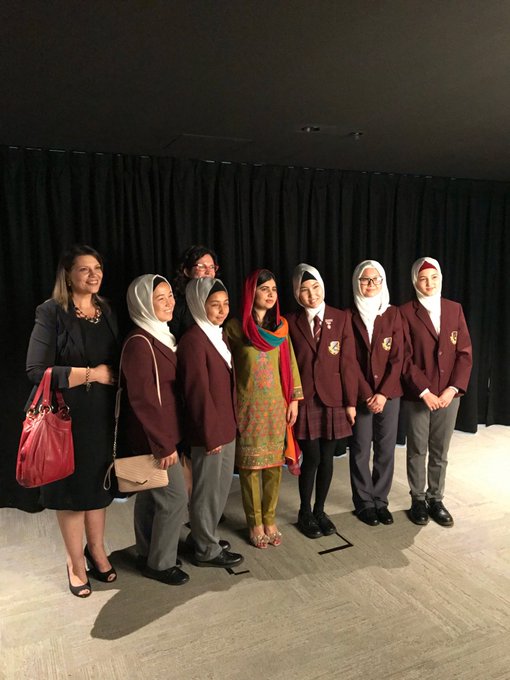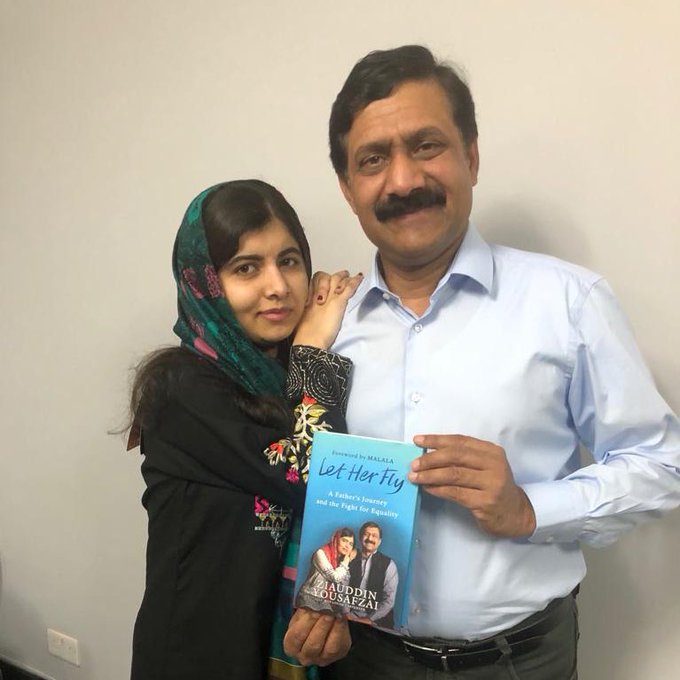By Julie Power & Pallavi Singhal
In the car on Monday night on her way to see the international activist for girls' education known simply as Malala, eight-year-old Sofia Carter of Kellyville asked her mother if the event would change her life.
"It might, darling, if you let it," Sofia's mother Maryanne Carter replied.
When she took the stage, Malala Yousafzai said nobody was too young to make a difference. "Do not let your age stop you from changing the world," she said.
"I was 11 years old when I started speaking out ... I was not thinking for a second that just because I was young I could not change the world."
Ms Yousafzai was in Sydney to stand for the 130 million girls who were not in school around the world. "I was one of them," she told the audience.
She remembered the day nearly 10 years ago in December 2008 when the Taliban announced its plan to ban girls from going to school in the Swat Valley in Pakistan.
Girls were limited to the four walls of their houses. They couldn't be human.Malala Yousafzai
"I still remember that day, that time, when I thought I was losing my dreams. No girl would be allowed to go to school. No girl had the right to become a doctor, a teacher or an engineer. Girls were limited to the four walls of their houses. They couldn't be human," she said.
Ms Yousafzai said she couldn't believe it wasn't a dream. But that day came, and she and another 5000 girls in her area couldn't attend school.
"Education is the future for girls, the future of women," she said to the young crowd at the ICC in Sydney.
When she met girls in refugee camps, she said, they too had dreams. They knew education could change their lives.
Like the many mothers and daughters among the 8000 people who flocked to see the 21-year-old - the first time she has visited Australia - Ms Carter wanted her daughter to hear Malala's "courageous" story. "I want (Sofia) to know that not everyone lives like her, and she needs to stand for something more than just herself," Ms Carter said.
Now studying at Oxford University, Ms Yousafzai came to fame when she survived an assassination attempt in Pakistan by the Taliban in retaliation for her blog posts criticising the extremist group for banning girls from going to school.
Despite a shot to the head and extensive surgery, she continued to campaign for girls' education, establishing the Malala Fund with her father. In 2014, when she was 17, she became the youngest person to win the Nobel Prize, splitting the award with another young activist. Since then, she has won nearly every humanitarian prize that exists, from the Philadelphia Liberty Medal, the United Nations International Children's Peace Prize and another named in Mother Teresa's honour. She's also had an asteroid named in her honour, "316201 Malala" .
To many young women and girls attending the event, Malala - as they call her - is the girl who wouldn't take "no" for an answer and "didn't care what others thought".
Mariama Bah, 13, who is in year 7 at Chester Hill High School in Sydney's west, said her dad first told her about Ms Yousafzai's shooting and didn't think she would survive.
"I love that even though they said no and even with the oppression, she kept fighting," Mariama said.
"She still went on, even though she got shot in the head, that's the most inspirational thing, she's amazing."
"She still went on, even though she got shot in the head, that's the most inspirational thing, she's amazing."
The school brought about a dozen students from its student representative council to listen to Ms Yousafzai speak.
Ms Yousafzai was only 11 when she started blogging about the Taliban, even then realising it would likely trigger an attack on her life.
"I used to think that one day the Taliban would come [for me]," she told Glamour magazine. "And I thought, What would I do? I said to myself, 'Malala, you must be brave. You must not be afraid of anyone. You are only trying to get an education—you are not committing a crime'.
"I would even tell [my attacker], 'I want education for your son and daughter'."
Her fear was grounded. In October 2012, Ms Yousafzai, then 15, was shot in the head by the Taliban - she is now deaf in one ear - on the bus home from school.
For Chester Hill High's deputy principal Julia Cremin, it was important for her students to hear about the importance of education.
"We have about 60 different nationalities represented at our school and a large number of our students have refugee or similar status and we thought it was important for them to hear a girl from a similar region to theirs talk about the importance of education," she said.
Ms Yousafzai has been 13-year-old Zeenat Razak's hero since she first heard her story. "She's such an inspiration, fighting against pressure from the Taliban, even though they said no education, she still fought for it," said Zeenat, who is in year 7 at Chester Hill High.
Ms Yousafzai was brought to Australia by The Growth Faculty as part of the Women World Changers series and she will also appear in Melbourne on Tuesday night. She is in Australia to continue her campaign for every child to go to school.
As co-founder of the Malala Fund, she is building a global movement of support to ensure girls have access to 12 years education.
Ms Yousafzai said the fund now invested in local change makers in dozens of countries. "In some places, girls can only go to school if there are female teachers, in other places it is a need to increase Indigenous education. This is a big, big mission, and I hope everyone will think about it, and think how they can help," she said.
"If you give an education to a girl, you are changing their life and the world, too. It is one of the best investments you can make,” she said to a round of applause.
On the day before the Taliban's edict took effect, she wrote in her blog nearly 10 years ago that she was discussing homework with a friend "as if nothing out of the ordinary had happened".
"Today, I also read the diary written for the BBC (in Urdu) and published in the newspaper. My mother liked my pen name 'Gul Makai' and said to my father 'why not change her name to Gul Makai?' I also like the name because my real name means 'grief stricken'," she wrote then.
Asked on Monday night in Sydney how the Taliban changed her life, she said before then, she played mock weddings. "And my brothers and other boys played police-and-thief game. When (the Taliban) came, (that game) converted into the Taliban versus the army," she said.
"You lose your childhood because you don't feel safe when you go outside because you are girl, you can't listen to music or watch TV, when all these things are taken, it is a difficult life."
Ms Yousafzai is now in her second year at Oxford studying politics and philosophy. She says she is treated like every other student and was making friends. Asked what she missed now she is living away from home, she replied "laundry". "I go home once or twice a term to wash my stuff," she said. "I get to enjoy the food and take the clean clothes back home with me."










No comments:
Post a Comment